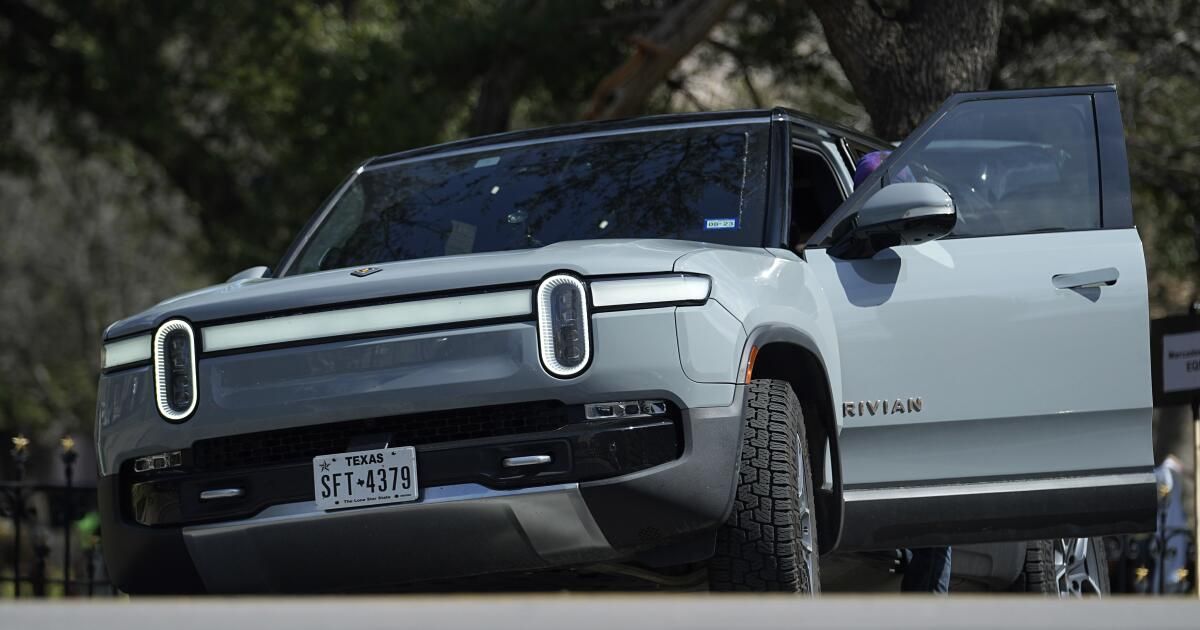Electric truck and SUV company Rivian will lay off hundreds of employees in a bid to save money as federal support for electric vehicle adoption wanes under the Trump administration.
The layoffs come less than a month after the expiration of a federal tax credit that once saved many customers $7,500 on new electric vehicles and $4,000 on used vehicles. Experts said sales will fall without the credit, which ended Sept. 30.
Irvine-based Rivian plans to lay off more than 600 workers, a company spokesperson confirmed, or about 4.5% of its workforce. At the end of last year, the company had just under 15,000 employees.
“We have made the very difficult decision to make a number of structural adjustments to our teams,” CEO RJ Scaringe wrote in a note to employees Thursday. “With the changing operating context, we have had to rethink how we are expanding our go-to-market functions.”
Rivian wasn't the only tech company to announce cuts this week: Meta laid off 600 employees within its artificial intelligence department on Wednesday in an effort to streamline operations and lower inflation. Meta has renewed its approach to AI in recent months as it competes with OpenAI and Google.
Last month, Rivian had a smaller round of layoffs that affected about 200 employees, or 1.5% of the workforce.
Demand for electric vehicles is stagnating as the market becomes saturated and the vehicles become harder to afford, said Karl Brauer, an analyst at iSeeCars.com.
President Trump's repeal of Biden-era electric vehicle incentives, as well as recent auto tariffs that make cars and parts more expensive, are contributing to the slowdown.
Rivian reported a 32% increase in vehicle sales to 13,201 in the third quarter, but lowered its full-year sales estimate. The company now expects to deliver between 41,500 and 43,500 vehicles in 2025, up from 46,000.
Brauer said the layoffs are indicative of problems in the industry, especially for companies like Rivian and Tesla that produce only electric vehicles and no gasoline alternatives.
“All companies are going to reduce the production of electric vehicles due to the drop in demand,” Brauer said. “Pure-electric vehicle manufacturers are probably already feeling it.”
Sales of electric vehicles in California in 2024 remained stable compared to previous years, The Times reported, raising questions about whether automakers can meet ambitious state mandates for the sale of zero-emission vehicles.
To boost sales, Rivian is preparing to launch a new, more affordable model that is expected to start at $45,000. The company's least expensive current model is the R1T pickup truck, priced at around $71,000. That price is unaffordable for many consumers, particularly with the loss of the federal tax credit.
Tesla, the electric vehicle giant led by Elon Musk, launched cheaper versions of its Model 3 and Model Y vehicles earlier this month. However, the launch did not impress investors and analysts said the new prices are not low enough to spark a surge in buying.
The new Model 3 Standard starts at $36,990, $5,500 less than the existing version of the car. The Model Y Standard starts at $39,990, $5,000 less than its more expensive counterpart.
Tesla shares held steady after the company reported its third-quarter earnings earlier this week. The company saw a 6% year-over-year increase in total automotive revenue.
Still, Tesla's numbers fell short of analyst estimates and Musk has yet to deliver on his long-promised robotaxi venture. Rivian reports earnings on November 4.
Following the news of the upcoming layoffs, Rivian shares rose more than 1% in trading on Thursday. Its shares have shown little change so far this year, while the tech-heavy Nasdaq Composite Index is up more than 15% over the same period.
Rivian and other electric vehicle makers benefited from a temporary boost in sales before the tax credit expired, as customers rushed to get the discount while it was still available.
National sales of new electric vehicles increased 19% in July from a year ago, Cox Automotive said, and sales in Orange County increased 7% in July from the previous month.
Now that credit has been eliminated, the sales decline could be harsh, Brauer warned. Rivian could get a boost when it launches its cheaper model, but in the meantime, the company needs to conserve funds.
“Rivian recognizes this and, as a result, is reconfiguring its production plans and cost structure,” Brauer said. “That's why they're laying people off.”








